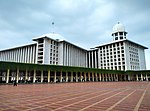Abangan
The Abangan are Javanese people who are Muslims and practice a much more syncretic version of Islam than the more orthodox santri.[1] The term, apparently derived from the Javanese language word for red, abang, was first developed by Clifford Geertz, but the meaning has since shifted. Abangan are more inclined to follow a local system of beliefs called adat and Kebatinan than pure Sharia (Islamic law). Their belief system integrates Hinduism, Buddhism and animism. However, some scholars hold that what has classically been viewed as Indonesian variance from Islam is often a part of that faith in other countries. For example, Martin van Bruinessen notes similarity between adat and historical practice among Muslims in Egypt as described by Edward Lane.
References
Notes
- ^ Murray, Alison J. (1991). No Money No Honey: A Study of Street Traders and Prostitutes in Jakarta. Oxford University Press, Incorporated. ISBN 978-0-19-588991-8., glossary p. xi
Sources
- Clifford Geertz (15 February 1976). The Religion of Java. University of Chicago Press. ISBN 978-0-226-28510-8.
External links

